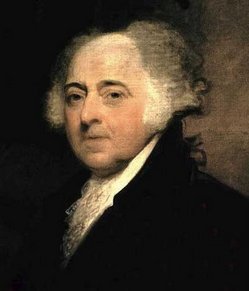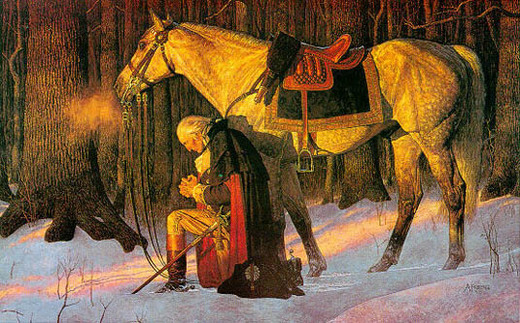
In a Thanksgiving proclamation, issued March 23, 1798, President John Adams asked for “His infinite grace, through the Redeemer of the World, freely to remit all our offenses, and to incline us by His Holy Spirit to that sincere repentance and reformation.”
Adams’ Thanksgiving proclamation enlisted the Almighty not only the cosmic struggles but the more pedestrian battles of his Administration. Adams urged Americans to ask God’s help to: “arrest the progress of that impiety and licentiousness… save our cities and towns from a repetition of those awful pestilential visitations under which they have lately suffered so severely…. bless all magistrates [and]… make them a terror to evil doers…. and extend the blessings of knowledge, of true liberty, and of pure and undefiled religion throughout the world.”
He appeared to be asking God to side with the Federalists’ in the growing war with the Jeffersonians. While asking for a national fast, Adams declared that the U.S. was “still held in jeopardy by the hostile designs and insidious acts of a foreign nation” (France) that was “subversive of the foundations of all religious, moral, and social obligations.” A few months before the passage of the notorious Sedition Act, Adams asked God to “withhold us from unreasonable discontent, from disunion, faction, sedition, and insurrection.”
James Madison would later argue that the inclusion of specific policy disagreements — and political jabs — in prayer proclamations had politicized a solmen act “to the scandal of religion as well as the increase of party animosities.” Even Washington’s proclamations were viewed that way, he said.
The proclamation probably backfired on Adams. He later wrote that this Thanksgiving decree was recommended by a Presbyterian assembly – a fact that ” alarmed and alienated” a variety of religious minorities, including “Quakers, Anabaptists, Mennonists, Moravians, Swedenborgians, Methodists, Catholics, protestant Episcopalians, Arians, Socinians, Armenians, & & &, Atheists and Deist.”
Therefore, he wrote, “A general Suspicon prevailed that the Presbyterian Church was ambitious and aimed at an Establishment of a National Church.”
Ironically, the Unitarian Adams was cast as leader of a Presbyterian takeover. “I was represented as a Presbyterian and at the head of this political and ecclesiastical Project. The secret whisper ran through them ‘Let us have Jefferson, Madison, Burr, any body, whether they be Philosophers, Deists, or even Atheists, rather than a Presbyterian President.’ This principle is at the bottom of the unpopularity of national Fasts and Thanksgivings. Nothing is more dreaded than the National Government meddling with Religion.”
Amazingly, Adams said that it was the thanksgiving fast more than anything else that led to his electoral defeat. “The National Fast, recommended by me turned me out of office.”
Adapted from Founding Faith: Politics, Providence and the Birth of Religious Freedom in America.
More from Beliefnet and our partners

